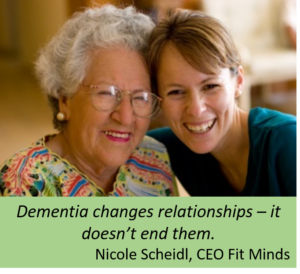The Cognitive Care Blueprint™ focuses on creating structure to support the brain health of your loved one. Helping them to maintain engagement with you, as well as keeping their ability to communicate for as long as possible, supports your relationship.
As I’ve said before – Dementia changes relationships, it doesn’t end them. Your mom is still your mom and your dad is still your dad. It is still important to maintain a relationship with them.

Understand Your New Reality
Your focus now has to be on understanding your new reality and helping your loved one maintain and improve their quality of life.
They are scared… Likely, so are you! Their self-confidence has been shaken. It is important, therefore to create an environment where they can thrive.
Terry Pratchett – one of my favourite authors – was diagnosed with early onset Alzheimer’s when he was in his 50s. He described it as feeling like he had two diseases. One disease was having Alzheimer’s and the other was knowing that he had Alzheimer’s.
They know something is wrong and this knowledge can be very distressing.
In this post and in the video series we give you some tools and strategies that can help you create that positive environment.
Create A Positive Environment
The first element of creating a positive environment is making sure your loved one has enough structure and stimulation (both mental and physical) to their day. Their lifestyle, health habits, daily activities and social network all have a huge impact on the health of their brain. Focusing on these five elements will help you build a positive environment.
Mental Activity
Mental activity – to be effective for brain health – should be novel and complex. That means it should be challenging for the particular individual that is engaging in the activity. You may find crossword puzzles really, really easy to do – and if that is the case, doing a crossword puzzle is no longer a novel and complex activity for you.
Novel and complex is important but (and here is the caveat) you also want the activity to be engaging and confidence-building. And this is why having interactions with another human being – instead of a computer – is so critical for an individual suffering from a cognitive impairment such as dementia. You can read body language, laugh with them, see if their eyes are filling with tears from frustration or pain – and adjust your approach. A computer cannot do these things.
Another important aspect of mental activity is that it should be global in nature. What do I mean by that?
The brain is a complex organ. Many parts of it contribute to overall functioning. Just like an athlete cross-trains for optimum performance, the science has shown that a globalized approach to cognitive stimulation is really best for overall effectiveness.
A Global Approach
In order to do this aim to provide activities across the main areas of cognition: Language and Music, Visual/Spatial Orientation, Memory, Critical Thinking and Computation.
Language and Music – Listening and singing to music, crossword puzzles, word search and other language games are great for exercising the verbal loop in the brain.
Visual/Spatial Orientation – mazes, tying knots, geocaching or other compass activities that challenge the brain to ‘visualize’ place are very good to challenge this area of the brain.
Memory – challenging both working memory and sharing long-term memories are effective ways to exercise this area of the brain. Working memory is an important aspect of critical thinking so completing working memory exercises (like Kim’s game) is a good way to strengthen this area.
Critical Thinking – completing logic puzzles and solving mysteries or riddles are great ways to exercise the critical thinking area of the brain. Reading the newspaper and discussing the issues of the day require both critical thinking and language skills and are a good way to engage both.
Computation – solving math puzzles or simply doing the multiplication table as you get dressed in the morning is a good way to keep this area of the brain sharp. Math skills tend to degrade with age – so all of us can benefit from some math exercises.
Providing this complete “brain workout” or “brain cross-training” is most effective for optimizing brain health. The outcome is helping the individual you love be all they can be for as long as they can be.
Physical Activity
The second element of creating that positive environment is physical activity. There are lots of scientific studies showing the importance of physical exercise to brain health. So part of a structured day includes time for aerobic exercise (like walking). Building this into your day is really important for brain health. Two things to keep in mind when you are putting a physical exercise program into place are fall prevention and adequate supervision.
It is important to prevent frail individuals from falling. A broken bone and time spent recovering can negatively impact mobility. Strengthening core muscles goes a long way to reducing the risk of falls. Exercises like sitting against the wall or leg lifts or taking part in a Tai Chi class can help improve stability.
One gentleman that I worked with enjoyed the stationary bicycle. Sometimes he would get set up on the bicycle and if someone wasn’t paying attention he would just ride and ride. He would exhaust himself. So it is important to monitor physical exercise.

Sitting is the new smoking – get moving!
Socialization
The third element for creating that positive environment is adequate socialization. Loneliness and isolation significantly contribute to mortality rates and individuals with no human contact decline faster than individuals who have daily human interactions.
There was an interesting study that showed that face-to-face contact was an important factor in reducing the rates of depression, while phone calls and emails did not have the same effect. My experience has reinforced for me, the importance of the face-to-face or “human element” in promoting emotional well-being. Incidentally, face-to-face interactions also help combat the apathy which normally accompanies dementia.
One of the elements we design into all our Fit Minds programming is to promote meaningful and positive interactions. While dementia changes relationships, it doesn’t end them. Your mom is still your mom, your dad is still your dad, your spouse is still your spouse. That person can still have a meaningful relationship with you. It is important for both of you to find a way forward..
Find activities that you can do together that are low risk – like taking them to a familiar coffee shop. They will feel comfortable in the atmosphere and if you go at the same time every week the faces will also feel familiar. Remember to provide cuing in the conversation. For example, you might say – “Mom, isn’t this a beautiful Monday morning?” so that she can take part in the conversation, knowing that it is morning and Monday.
Building a supportive social network is very important for brain health … and enjoying life!

Isolation increases dementia risk – take time to connect.
Nutrition
The fourth element that is also important to address is nutrition.
Nutrition as an aid and treatment to mental health is receiving increased attention and there is a lot of research being done in this area. But I want to focus on two ideas in this post.
First of all I want you to think about good hydration.
As we age we lose our thirst trigger – so while we may be getting dehydrated our body doesn’t tell us we are thirsty.
And a small amount of dehydration can lead to dementia-like symptoms…like poor short-term memory, fuzzy thinking etc. So making sure that your loved one remains well-hydrated is important.
How much water should be consumed?
A guideline would be one cup of water for every 20 pounds of body weight. That means an individual who weighs 100 pounds should shoot for 5 cups of water. A good way to do this is to get a water bottle that they can sip on throughout the day. You can put a lemon slice in it – or cucumber and mint – whatever is appealing.
The second idea I want to focus on is that the brain is a ‘fat’ organ. Not all fat is bad. The brain needs a certain amount of fat for optimum performance. So cutting fat completely out of your diet may be detrimental to brain health. I’m talking about the kind of fat that you get from natural sources such as almonds, avocados, eggs, full-fat yogurt, or fatty fish like salmon.
As well, every individual is unique so consult your family doctor or nutritionist to confirm your food plan.

A Healthy Breakfast on the Brain Essential Nutritiets (BEN) Scale
Spirituality
Finally, the fifth element is the whole area of spirituality. This is a really unique area for each individual. Broadly speaking, spirituality is that area of our life where we work out what is meaningful to us … it is our inner life that gives us peace and tranquility.
As much as possible, help them to continue participating in the faith community that was part of their life. This participation will go deeper than mere memory and will help reduce anxiety.
Individuals suffering from dementia are dealing with a lot of anxiety and fear. Knowing they are loved and supported is really, really important because emotional memory remains strong. While they often won’t remember what you said, they will definitely remember how you made them feel. Helping them feel loved and supported will go a long way to reducing feelings of anxiety and distress.
Ultimately, when creating an environment where the individual you love is supported and thrives you need to think of these five elements.
Create Your Plan
Now you are ready to create a plan. If you want to make us part of that process, you can sign up for the video here.
At the end of each video we give you the opportunity to sign up for a phone consultation. During the phone consultation we will help you create the Cognitive Care Blueprint that is right for your loved one. If you think that would be helpful – sign up – and we’ll see you on the inside!




0 Comments